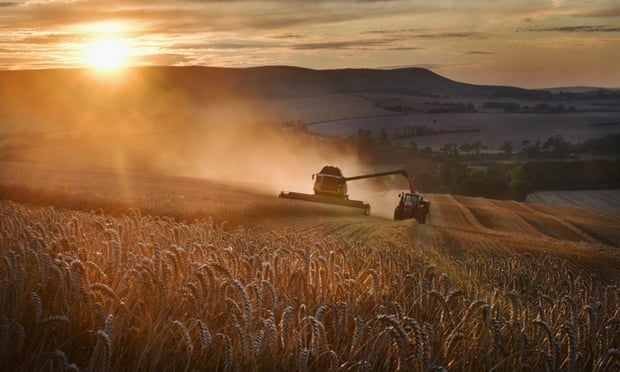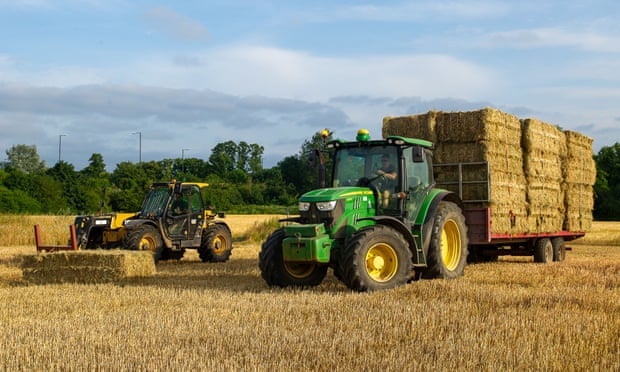May 20, 2025 | 11:17 GMT +7
May 20, 2025 | 11:17 GMT +7
Hotline: 0913.378.918
May 20, 2025 | 11:17 GMT +7
Hotline: 0913.378.918

The government has still not made clear how food production fits in with its proposed new schemes,’ the NFU said. Photo: oversnap/Getty Images
The government’s plans for a post-Brexit scheme to support British farming are based on little more than “blind optimism” and risk increasing the UK’s reliance on food imports, a parliamentary inquiry has warned.
The EU’s scheme of subsidies – known as the common agricultural policy (CAP) and worth £3bn-a-year to UK farmers – was one of the long-running complaints of Eurosceptics, who saw the ability of Britain to draw up its own scheme of payments as one of the major benefits of Brexit. Ministers had said the new scheme would be used to increase the environmental benefits of agriculture.
However, MPs on the powerful cross-party public accounts committee (PAC) found there remained a crippling lack of detail around the environmental land management schemes (ELMs) designed to replace EU payments. They said that by the government’s own admission, “its confidence in the scheme looks like blind optimism”. The Department for Environment, Food and Rural Affairs (Defra) had given no explanation of how the new scheme’s impact on English farmers would be mitigated, warning that some would see their income from direct payments reduce by more than half by 2024-25.
Geoffrey Clifton-Brown, the Tory deputy chair of PAC and a long-term Brexit supporter, said there were still “no clear plans” to replace CAP, more than five years after the EU referendum. He warned some small farms on “wafer-thin margins” could go out of business.
“Farmers, especially the next generation who we will depend on to achieve our combined food production and environmental goals, have been left in the dark. It is simply wrong that Defra’s own failures of business planning should undermine the certainty crucial to a critical national sector,” he said.
“The UK is also already a large net importer of food and we heard in evidence that the ELMs’ vague ambition to ‘maximise the value to society of the landscape’ may in reality mean that that increases further. The recent energy price crisis should be a salutary warning of the potential risks to the availability and affordability of food if the UK becomes even more reliant on imports.”
The new scheme aims to supply “public money for public goods”, with farmers funded to restore nature, nurture the soil, improve air and water quality, and provide habitats for wildlife through ELMs. The National Farmers’ Union, however, said the report should mark a “wake-up call” for the government and said farmers had been left in an untenable position through a lack of information.
“We have considerable concerns that not all farmers will be able to get involved,” said Tom Bradshaw, the union’s vice-president. “The government has still not made clear how food production fits in with its proposed new schemes. This must be addressed now, if they expect farmers to join. As the PAC highlights, we could simply end up increasing imports of food produced to lower environmental standards.
“It’s crucial Defra carries out and publishes the results of impact assessments to understand the true impact of the proposed changes, something we have repeatedly asked for but has not been forthcoming.”
Dustin Benton, policy director at the Green Alliance environmental thinktank, said it was not clear that the new scheme would help the government meet its own climate and nature targets. “We need ministers to say how ELMs will add up to achieving net zero carbon and restoring nature so farmers can plan their businesses,” he said. “Without this, the government’s promised green Brexit looks increasingly out of sight.”

Ministers claim the new scheme will increase environmental benefits. Photo: Maureen McLean/Rex/Shutterstock
Doug Parr, Greenpeace UK’s chief scientist, said the scheme could have unintended consequences for consumers and the planet: “The big danger is that we end up with an even more divided two-tier food system, where cheaper food from abroad, with huge environmental costs, replaces food that could be grown in nature-friendly ways here.”
“Working in this way is inefficient, unhelpful to UK land managers and increases the potential of perverse outcomes, such as driving increased deforestation abroad,” he said.
George Eustice, the environment secretary, said: “We disagree with many of the points made by the committee which fail to take account of recent developments. Farm incomes have improved significantly since the UK voted to leave the EU in 2016 and there will never be a better time to improve the way we reward farmers.
“In December, I set out comprehensive details of the sustainable farming Incentive including full payment rates and we published an in-depth analysis of UK food security and agricultural output. In the past week we’ve shared further details of the local nature recovery and landscape recovery schemes and announced a major increase in payment rates for those farmers involved in existing agri-environment schemes.”
(The Guardian)

(VAN) Attempts to bring down the price of the Japanese staple have had little effect amid a cost-of-living crisis.

(VAN) Fourth most important food crop in peril as Latin America and Caribbean suffer from slow-onset climate disaster.

(VAN) Shifting market dynamics and the noise around new legislation has propelled Trouw Nutrition’s research around early life nutrition in poultry. Today, it continues to be a key area of research.

(VAN) India is concerned about its food security and the livelihoods of its farmers if more US food imports are allowed.

(VAN) FAO's Director-General emphasises the need to work together to transform agrifood systems.

(VAN) Europe is facing its worst outbreak of foot-and-mouth since the start of the century.

(VAN) The central authorities, in early April, released a 10-year plan for rural vitalization.